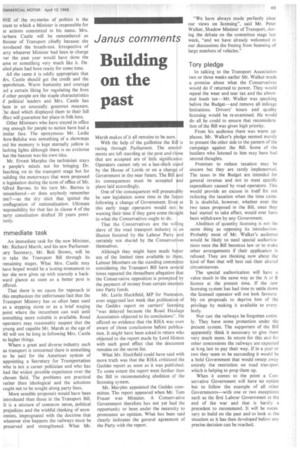Janus comment
Page 51

If you've noticed an error in this article please click here to report it so we can fix it.
Building on the past
Marsh makes of it all remains to be seen.
With the help of the guillotine the Bi is racing through Parliament. The ame dments are left standing at the post and th se that are accepted are of little signifies ce. Operators cannot rely on a last-ditch St nd by the House of Lords or on a chang of Government in the near future. The Bill nd its consequences must be accepted nd plans laid accordingly.
One of the consequences will presum bly be new legislation some time in the future following a change of Government. Eve at this early stage operators would not be wasting their time if they gave some tho ght to what the Conservatives ought to do.
That the Conservatives are the wit ing slave of the road transport industry is an illusion fostered by the Labour Party nd certainly not shared by the Conservat ves themselves.
Although they might have made b ter use of the limited time available to th m, Labour Members on the standing commi tee considering the Transport Bill have self ral times repeated the threadbare allegation hat the Conservative opposition is prompte s by the payment of money from certain inter sts into Party funds.
Mr. Leslie Huckfield, MP for Nunea on, even suggested last week that publicatio of the Geddes report on carriers' licen ing "was delayed because the Road Hau age Association objected to its conclusions". He offered no evidence that the RHA was even aware of those conclusions before publication. It might have been asked in return who objected to the report made by Lord Hinton with such good effect that the document remains on the secret list.
What Mr. Huckfield could have said with more truth was that the RH A criticized the Geddes report as soon as it was published. To some extent the report went further than the Bill in recommending abolition of the licensing system.
Mr. Marples appointed the Geddes committee. The report appeared when Mr. Tom Fraser was Minister. A Conservative Government therefore has not yet had the opportunity or been under the necessity to pronounce an opinion. What has been said clearly indicates the general agreement of the Party with the report. "We have always made perfectly clear our views on licensing", said Mr. Peter Walker, Shadow Minister of Transport, during the debate on the committee stage last week, "and we have already welcomed in our discussions the freeing from licensing of large numbers of vehicles."
Tory pledge
In talking to the Transport Association two or three weeks earlier Mr. Walker made a. promise about what the Conservatives would do if returned to power. They would repeal the wear and tear tax and the abnormal loads tax—Mr. Walker was speaking before the Budget—and remove all mileage limitations. Drivers' hours and quality licensing would be re-examined. He would do all he could to ensure that reconsideration of the Bill was given high priority.
From his audience there was warm applause. Mr. Walker's pledge seemed merely to present the other side to the pattern of the campaign against the Bill. Some of the hauliers who listened to him may have had second thoughts.
Promises to reduce taxation may be sincere but they are rarely implemented. The taxes in the Budget are intended for general revenue and not to meet specific expenditure caused by road operators. This would provide an excuse in itself for not reducing the taxation when the time came. It is doubtful, however, whether even the two taxes proposed in the Bill, once they had started to take effect, would ever have been withdrawn by any Government.
Abolition of quantity licensing is not the same thing as opposing its introduction. Probably most of Mr. Walker's audience would be likely to need special authorizations once the Bill becomes law or to make other arrangements if their application is refused. They are thinking now about the kind of fleet that will best suit their altered circumstances.
The special authorization will have a value much in the same way as the A or B licence at the present time. If the new licensing system has had time to settle down the licensed operator will not look favourably on proposals to deprive him of the privilege by making it available to everybody.
Nor can the railways be forgotten entirely. They have some protection under the present system. The supporters of the Bill apparently think it necessary to give them very much more. In return for this and for other concessions the railways are expected at len last to pay their way. If in a year or two they seem to be succeeding it would be a bold Government that would sweep away entirely the restriction on road transport which is helping to prop them up.
When it comes to the point a Conservative Government will have no option but to follow the example of all other Governments—with one or two exceptions such as the first Labour Government at the end of the war and that is hardly a precedent to recommend. It will be necessary to build on the past and to look at the situation as it has then developed before any precise decision can be reached.




































































































